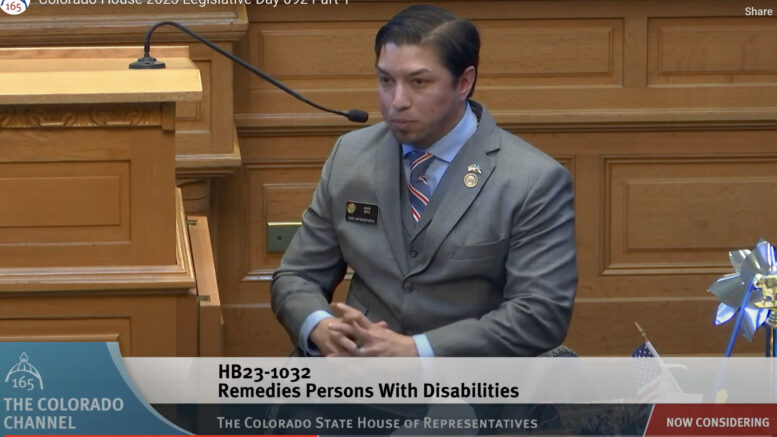The sponsor of a bill to increase the damages that Colorado businesses could be forced to pay for Americans with Disabilities Act violations bumped the most significant provisions of the bill back to a study Monday — a move that should ease business leaders’ fears about the proposal.
House Bill 1032, when it eked out of the House Judiciary Committee in March, sought to allow plaintiffs in ADA lawsuits to seek emotional damages of $250,000 to $500,000 and sought to require courts to award attorneys’ fees to prevailing plaintiffs — both changes that sponsoring Rep. David Ortiz, D-Centennial, said were aimed at getting more lawyers to take such cases. The bill also sought to allow complainants to file cases in court without having to exhaust their administrative remedies through the Colorado Civil Rights Division, a process that Ortiz described as lengthy and often stacked against those whose rights have been violated.
After an amendment that Ortiz offered Monday during House debate, however, all that remains in the bill now is plaintiffs’ ability to go to court without waiting for the end of the CCRD process. Andrew Montoya, an attorney for the Colorado Cross-Disability Coalition, had told the judiciary committee that bypassing administrative exhaustion of remedies was a long-standing allowance in state law until courts began requiring it in 2014.
Big changes
In place of the bill’s requirement that judges shall award attorneys’ fees to prevailing plaintiffs, Ortiz’s amendment just says that they may do so if they choose. And rather than letting complainants seek emotional damages — an allowance that the U.S. Supreme Court forbade under federal law last year, leaving the issue up to states — HB 1032 now seeks to create a task force of business leaders, plaintiffs’ lawyers and defense attorneys to study emotional damages and other issues surrounding ADA lawsuits.
Ortiz, who was paralyzed below the waist while serving in the Army 11 years ago, said that he was pulling out the most contentious parts of the bill to create a chance for further discussion about them. But even as the bill faced an uncertain outcome in the House before the changes, he also emphasized that more enforcement is required of the ADA, which Congress passed in 1990, because he sees too many public-facing companies that ignore it.
“The bottom line, folks, is the world is not accessible despite the ADA being law for 33 years,” Ortiz said. “All we are doing in the current state of this bill … is making sure we are clarifying what already exists in state statute around exhaustion. Exhaustion is bad. It’s killing us.”
Who it affects
HB 1032 applies to places of public accommodation — a broad group of businesses and locations that includes restaurants, theaters, doctors’ offices, pharmacies, hotels, retail stores, museums, libraries, amusement parks, private schools and day care centers.
Business attorneys said their issue wasn’t with the state punishing major violators of the law so much as with the bill’s likelihood to increase lawsuits over minor violations — legal actions that Robinson Waters & O’Dorisio P.C. shareholder Dan Block called “drive-by lawsuits.”
Courtenay Patterson, a Longmont attorney specializing in defending businesses against ADA claims, said that she’s represented mom-and-pop restaurants threatened with lawsuits for hanging disabled-parking signs five inches too low. For small businesses, paying out $10,000 or facing long and expensive legal trials can be devastating, she told the committee last month.
Removing qualified immunity in ADA lawsuits?
Even after Ortiz offered his amendment, House Republicans tried unsuccessfully to add several more changes to the bill.
One amendment from by Rep. Ken DeGraaf, R-Colorado Springs, sought to remove qualified immunity from government employees who intentionally violate the ADA, meaning they would have to pay penalties themselves rather than allow penalties to be paid with taxpayer money. Ortiz said that while he is open to having the task force discuss the idea of how to make such an idea work, the amendment would serve as a “poison pill” to HB 1032 because of its conflict with established law, and he successfully asked legislators to reject it.
The bill is expected to receive final approval from the House as early as Tuesday and then head to the Senate, where it’s likely to face much less opposition in its revamped form.
